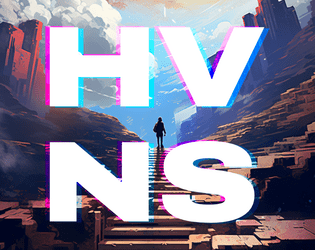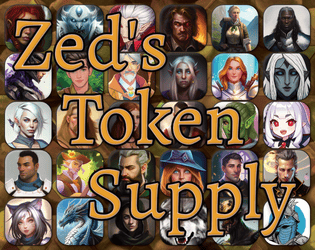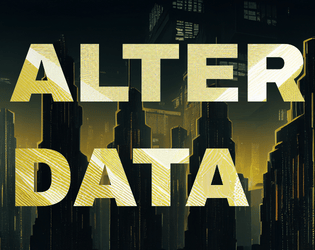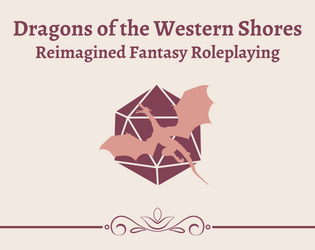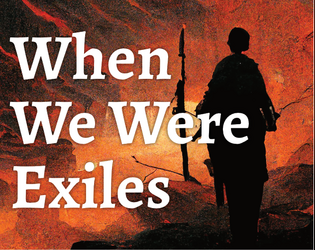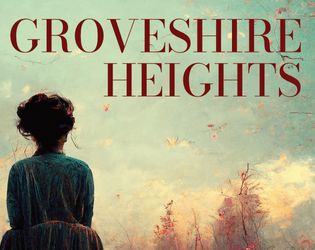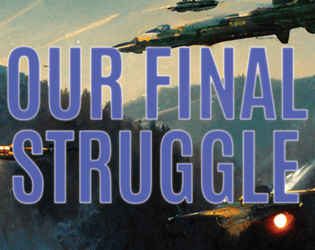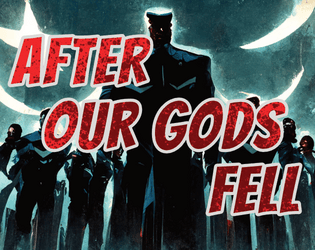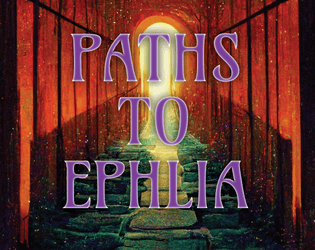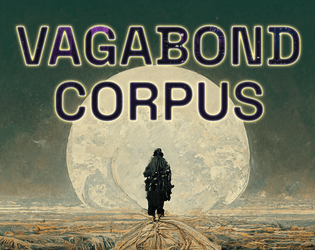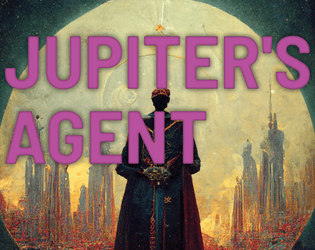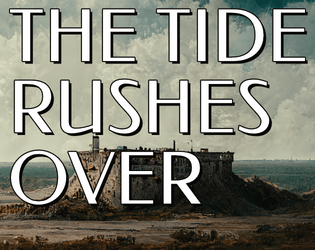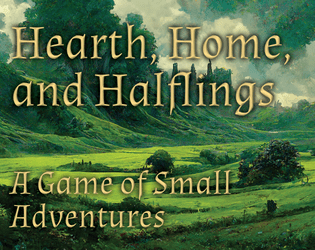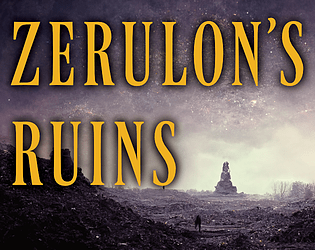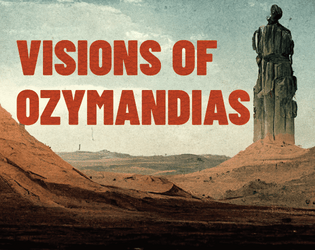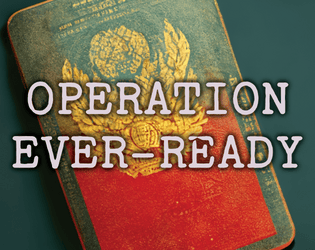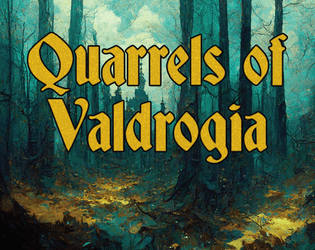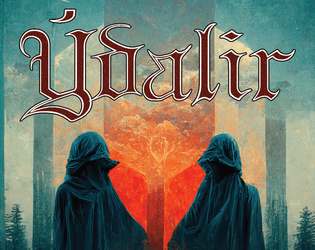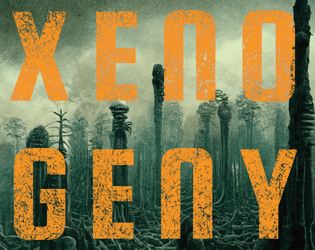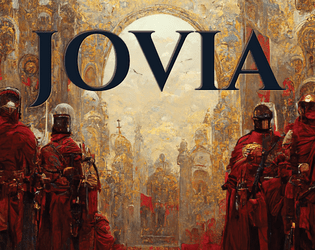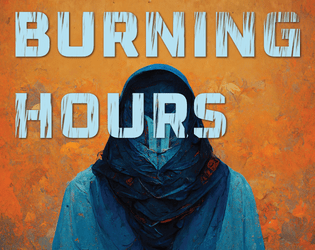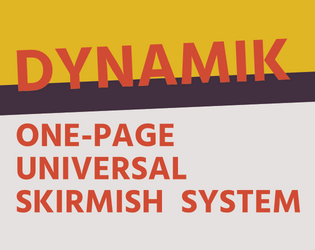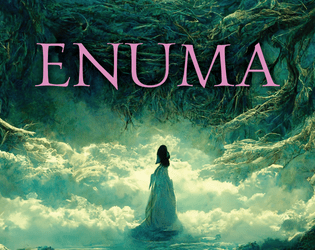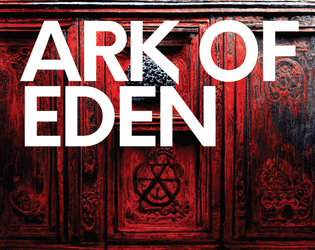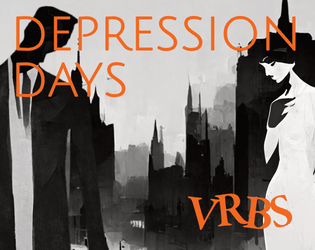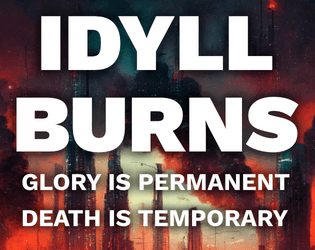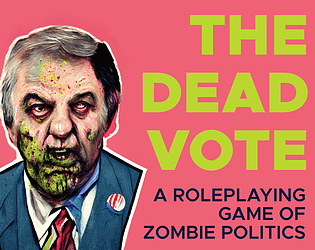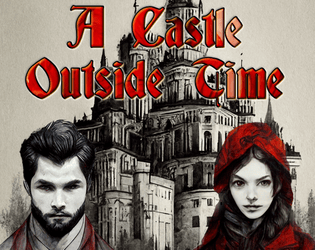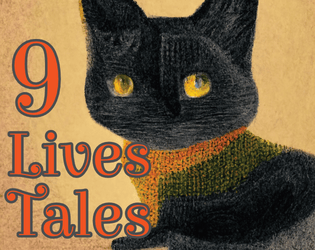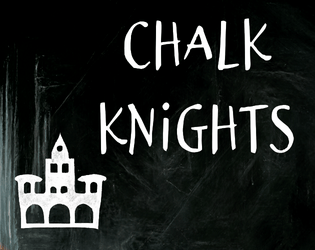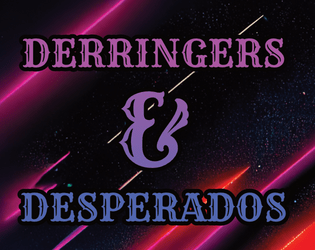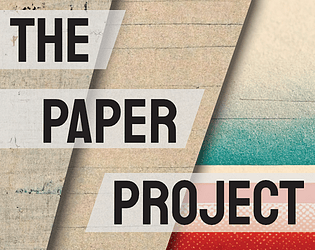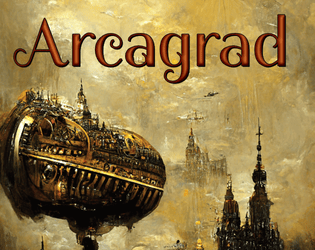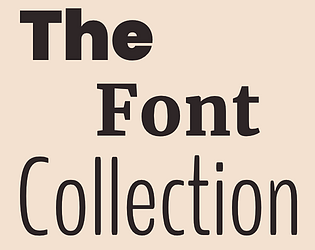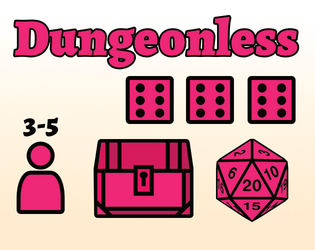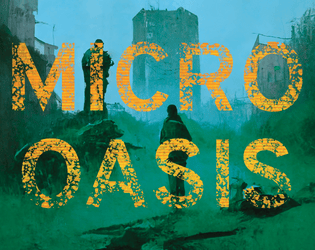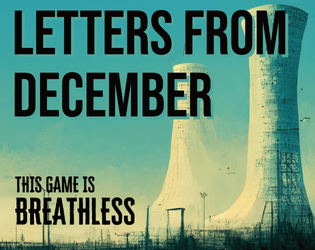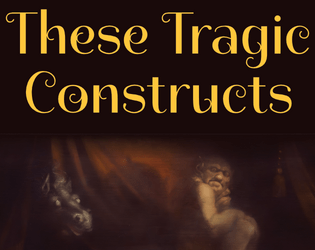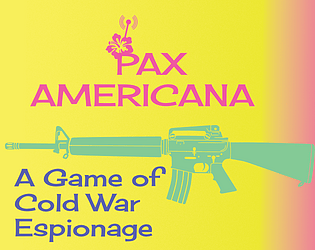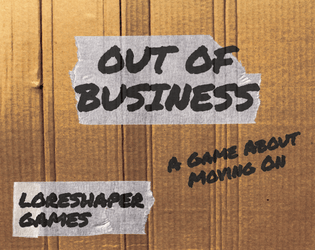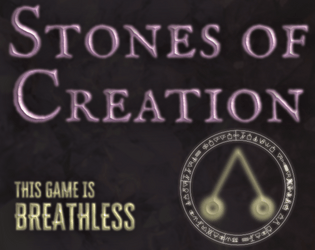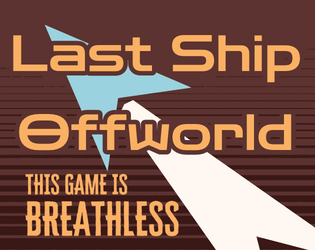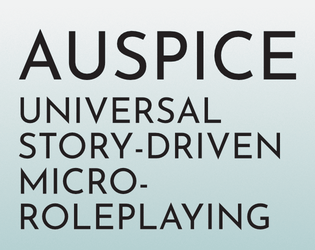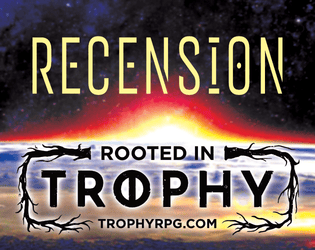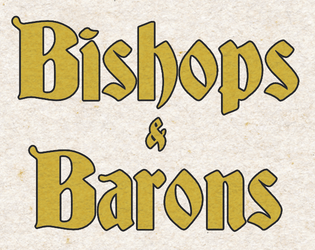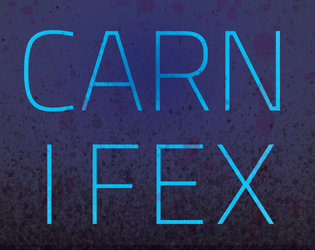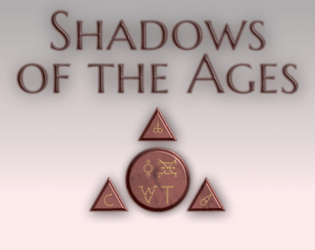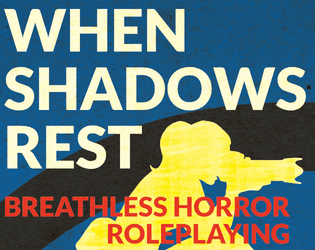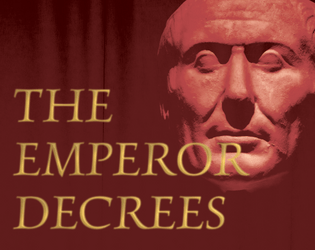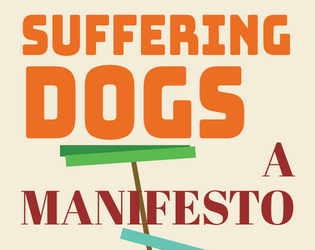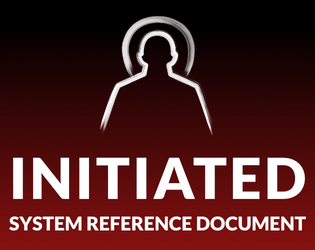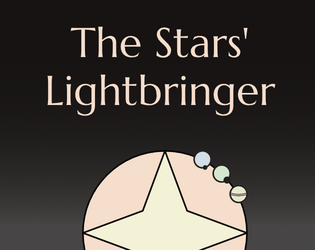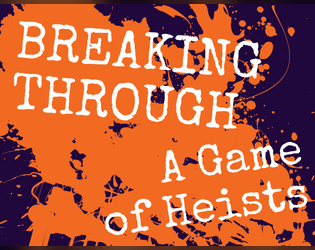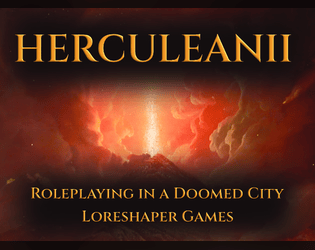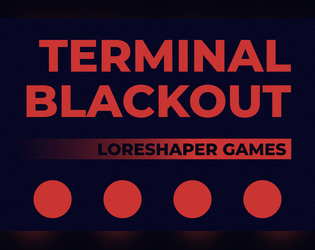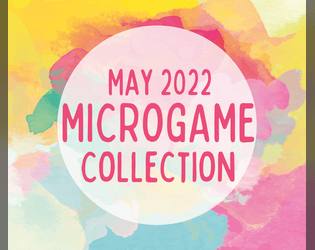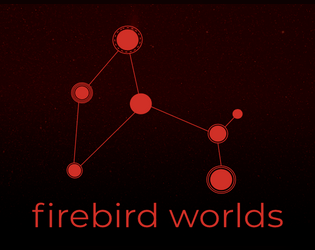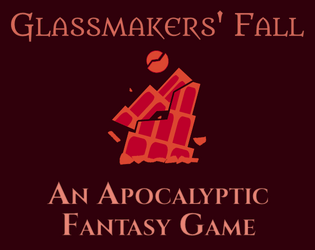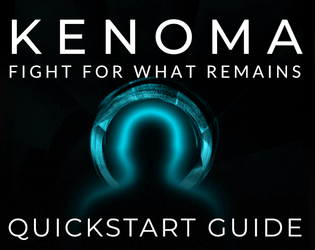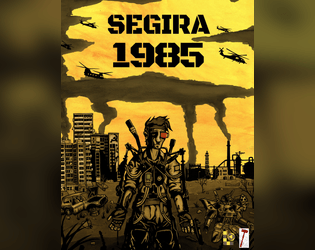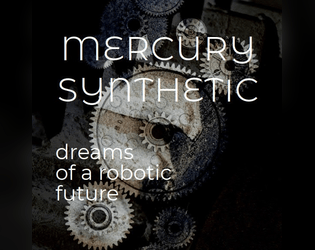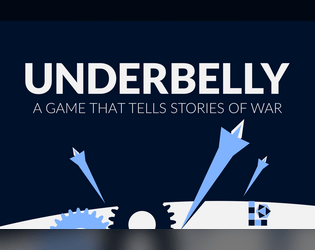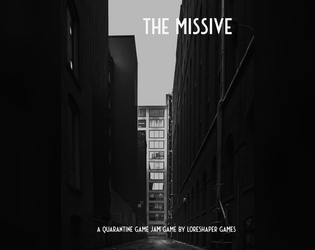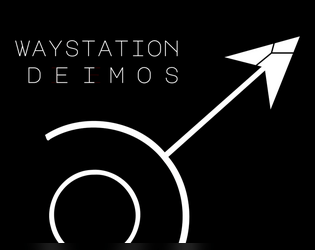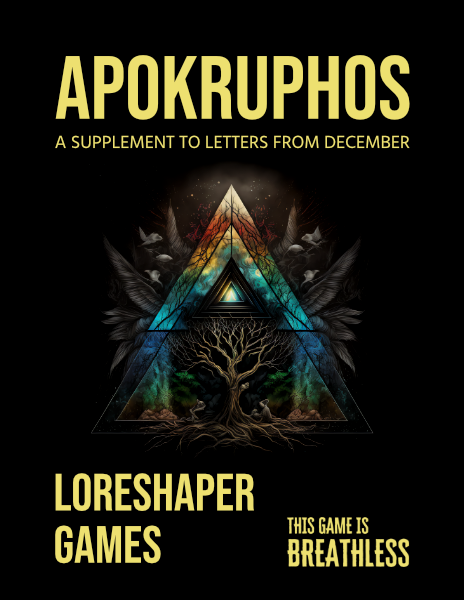Brilliant! Love it.
Loreshaper Games
Creator of
Recent community posts
Update:
Ramah is designed around a very simple dice system with a couple complications.
Each character has a basic concept that allows them to roll a d6/d8/d10 (depending on whether the task benefits, is neutral, or detracts from the action at hand).
Characters also have "connections" (gear, social connections, etc) that provide a +1 bonus. If you "offer" them on a roll, you add your die result instead of getting the +1, but you can get that +1 bonus without offering them (e.g. as a passive buff).
When you take an action that requires rolling dice, a player appoints a "seer" to roll for them.
The "seer" is another player with a character, and they can see the result before they tell you if you succeed or fail. At this point, they can suggest that you make an offering. You can only offer the seer what they ask for, and the seer gains that connection for their own character.
The Storyteller also takes on the role of the Conqueror. They can put an offering to the sword, destroying it. This is intended both as a way to prevent offering-spam (e.g. if people are "up to something" the Conqueror gets upset and punishes them) and a way to heighten tension, though the Conqueror is explicitly not adversarial to the players (they are, after all, imperial subjects).
Desecrators of the Deep brings the best of fish-and-knife action-horror roleplaying to a table near you.
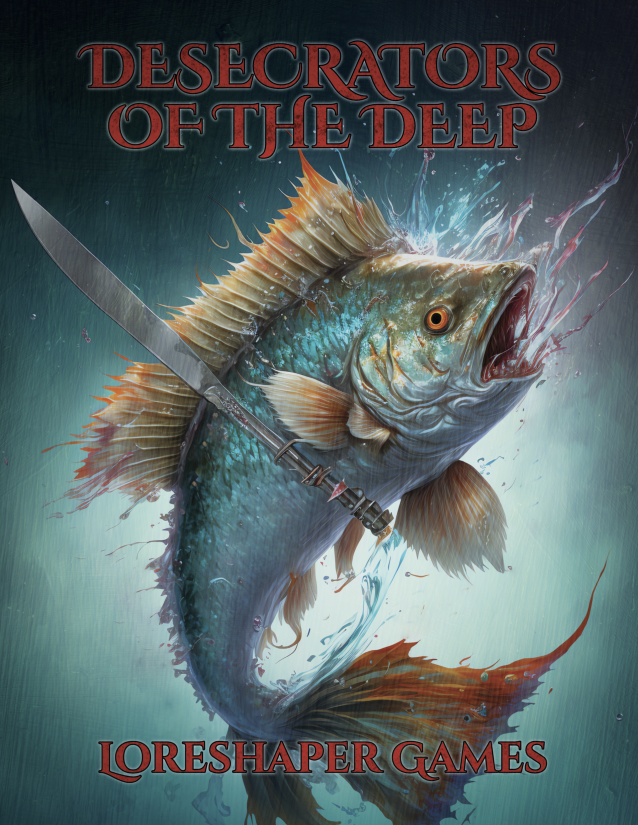
"You are a fish with a grudge. Humans from above the waves came and desecrated your home. They took your family. They ruined everything. Now it’s your turn. You have consulted the Old Ones, and the rituals are complete. The stars align, and you will have your revenge."
Featuring a streamlined d100 system, multiple character archetypes, and a focus on frenetic violence, Desecrators of the Deep will revolutionize the FishBlade genre.
Coming Q1 2023 from Loreshaper Games.
It really is basically narrative.
The stress is the mechanical cost, which can and should be something that players are worried about if the GM decides to limit how often they have downtime.
The entities that grant Deals are big on being in charge. The favors they do are essentially effortless for them (at least as far as we think of effort), though they may have a toll on the physical world at large when physics gets too wonky. Deals are ostensibly a way of proceeding through the Work and bringing about a better world, but Letters from December is set in the end-game of a world where it's too late for that and even if entities understood and agreed to their purpose most have given up on humanity keeping their side of the bargain.
Deals have three possible functions from the entity's side of things.
1. A symbolic gesture of gratitude.
2. A psychological preparation on behalf of the player's character to prepare for an encounter with their entity.
3. An entity's one-sided dominance struggle manifesting in various ways.
So, for instance, a relatively benign entity may request a sacrifice (by burning incense, an animal, etc.) in exchange for power to keep their human charges from becoming complacent. Until this is met, the character can't get another Deal. For game purposes, this was left out because I didn't want to create this imbalance, but the trade-off you get for this is that there isn't any psychic horror element to it. Incantations, vows, and oaths have a similar effect and can be accomplished instantly, though the former might be too easy.
If you go this route and have narrative requirements, you may wish to remove the Stress from a Deal, though be forewarned that it's going to be hard to play with a group of people each doing their own Deals (unless you retain the option to pay off deals with Stress, which I think makes more sense at the time the Deal happens than afterward). You could say that if someone still has a quest or sacrifice to perform they can spend 2 Stress for the next deal, then 1 Stress for each after that until the quest/sacrifice is finished.
An entity with a less human personality may have various preparation rituals. Something like the ingestion of psychoactive drugs may contribute to the ego death required to fully engage with such a being. These aren't well-developed in the world because the entities the characters I've explored all have fairly human-like personalities, but this could even involve entering a trance or frenzy, or even just engaging in extreme physical exertion (like lifting a massive stone).
These may not even be strictly unpleasant, from a human perspective, but they're costly and taxing enough to justify a point of Stress from the in-game perspective. If it might require odd or rare materials, these may manifest around the player character when they're seeking a Deal from their entity as a sort of handshake agreement. If the character ever misuses these gifts they may forfeit their ability to get more in the future.
Finally, there are the human-but-malevolent entities that just enjoy kicking people around. These can be harder to use at the table for safety reasons, but in the fiction Letters from December is based on they include:
• Drinking the blood of defeated foes (as in Cost)
• The entity manifests and taunts and belittles the human partner for not being good enough to manage on their own
• Visions in which the entity tries to force the human partner to share their nihilistic worldview (in an alternate timeline where the Destroyer succeeded, he could serve as an entity and this was his preferred approach; the Cult of Hunger still has lingering after-effects of this in Letters from December)
• Demands for various demeaning, risky, or antisocial acts in exchange for assistance
These entities use their human partners as tools, but they don't really have anything they want from them. Instead they're amusing themselves at their partner's expense.
The relationship between entities and their human partner(s) is semi-symbiotic. Entities can only really interact with the physical world through humans, but they don't always care to. Humans with a connection to entities can use them for power, but the entities can span the whole spectrum from being amused, too alien to comprehend the situation, lazy and indifferent, or actively detesting the pests who are taking them away from their own routine. However, no entity really wants their partner(s) destroyed.
Nominally, the goal of an entity is to guide their human partner(s) through the Work, and some do, but most of the ones with an intelligible personality are bored of doing this after millennia of false starts or scared that the Destroyer might actually purge them from existence. While the Destroyer has failed, the entities don't know this and players are unlikely to figure it out. Entities advance ahead of their partners while the Work develops, and become more personified as the process continues. However, this won't grant a personality to a truly strange and alien entity–it instead becomes more predictable and less erratic, and may begin conforming to its partner's expectations of it.
Of course, all of this can be adapted as you want at your table.
I'm preparing for a v0.2 update.
The big changes have been some refinements to the core content and a couple layout changes, plus more guidance for hacking and advancing the system.
I'm interested in hearing from people who have looked at and used Initiated (as well as people who chose not to use Initiated) about features they'd like to see.
In particular, I have the following questions:
- Does the hacking guidance section work? Would people prefer having pre-built rules to add in as they see fit?
- Do the three generic layers work well? They're the original core I built Hammercalled/Initiated from, but they were always meant for more adaptation?
- Does the character sheet work? Are there any other formats/styles for character sheets and logos that people would like?
Update: I've started working on Nova Tali, a system reference document for the core that will power Jovia and which also integrates some of Alter Data's philosophy/explorations.
My goal is to get the Nova Tali SRD out this week, and then move along to Jovia proper and integrate those rules into its system with its own unique Roman twist. I don't see any major delays or roadbumps keeping me from doing that, though it might wind up coming out on Monday if something unexpected comes up.
Alright, I'm going to share something I'm working on. I didn't have time to finish and I wanted to have at least one resource for people that want to get into making a game with AI to view, even if it's partial.
I've been using Midjourney for about two months now. I make tabletop roleplaying games, which are somewhat different in their needs (since I need illustrations, not sprites/textures/etc), but the basic principles still apply and there are certainly people who use Midjourney as part of a 3d art, pixel art, and texture workflow.
My plan is to make an itch page that features the (free) book and its samples, but for now you can have the first twenty pages or so. The Midjourney community is incredibly helpful, so if there are any other questions you have they can probably help you out with them (and I'm happy to provide advice and share my tips).
https://www.dropbox.com/s/8hox6yzlsr5ekmt/Midjourney%20for%20Game%20Designers.pd...
I've also used Midjourney in a few of my own projects, which you can see by clicking through to my store page (I'm not going to drop a bunch of links here). I even made a texture resource pack, The Paper Project, using Midjourney, and using that would technically satisfy the requirements for Ludus Ex Machina.
My initial plan for the jam is to make an expanded version of Jovia, with one of my intentions being the creation of a tali ruleset based SRD.
You can find an overview of it here (courtesy of @hessan_yongdi, who is a great person to follow!):
It's one of the example games in the jam listing, and it's CC-BY 4.0 licensed (the text itself may not say that but the store listing should), so feel free to use the tali mechanic (which, admittedly, is almost certainly in the public domain) however you want, even if you're borrowing my implementation of it word-for-word.I also recently released Alter Data, which applies this ruleset but replaces the d4 (which replicates knucklebones) with a d6, giving somewhat more design space to work with.
Figuring Out the Game Design
Jovia was conceived as a one-page game, and that means that there were things that couldn't be included because of length limitations.
The core is simple: roll four dice, try to get four different results. 4 is bad (unless you get a straight--which is special).
Now, there are a few different variations of tali, and while they're not all recorded with great accuracy there are many that care about particular combinations.
In Alter Data, I didn't have to worry about this because it has a 1-6 space, with 1s being good and 6s being bad. But with tali, you do have fewer options to move around. Having a very simple system still worked out to having a good numerical space to work in.
Tali is a little different because you have fewer possible results, so manipulating the number of dice is less of an option.
Jovia's Existing Concepts
You go for 1, 2, 3, 4 by rolling four dice. The number of unique results is your score (e.g. 1, 1, 2, 1 gives 2 score). Higher is better.
This will likely stay the same in the expanded game.
There are two forms of character input: score manipulation and strengths/weaknesses.
Score manipulation involves simply adding a point to your score. Since the score you require is based on the difficulty of the action, you wind up with a simple scale for the GM to use.
Characters in Jovia get a Heritage, reflecting some divine descent that they claim. This is a score manipulation (+1).
They also get a virtue and two "responsibilities" (profession) that gives them a reroll each. for a maximum total of 3 rerolls.
This is very powerful, and maps onto what I'd want to do with a one-page game since there isn't room for character advancement.
4s give a mishap, which is usually a complication. When you suffer a mishap, you might mark off one of your responsibilities, which temporarily reduces your power and can lead to character death.
For a one-page game, I think this works, but it's rather limited.
Concepts to Experiment With
The obvious elephant in the room is that characters hit very high power levels when they mix their things. To turn Jovia into a longer game means working around the limitations of the d4 and figuring out a way to provide greater diversity to characters while also allowing some overlap (e.g. if you have two characters who descend from Mars they already occupy 90% of the same space).
Here are some things I'm thinking about doing.
1. Extend the score space. This would lead to a numerical scheme somewhat like Fudge, where you have a dice mechanic that provides a random number *around* a point primarily determined by static numbers.
For instance, you might have your descent provide a bonus to your score, but also your responsibilities or heroic attributes. These could be capped, or even made exclusive but given their own value.
2. Dice pool manipulation, perhaps using a static attribute. You might roll more dice in something you're good at, and fewer dice in something you're not. I probably can't go above 5 dice in any circumstance without giving a pretty good chance of straights, which could just provide 4 score and defense against a setback without causing too much trouble.
My initial idea here would be to have a small set of attributes that determine how many dice you roll.
3. Points pools. This is almost certainly the best way to handle rerolls, instead of having flat rerolls on any relevant actions.
This is also a great way to power special abilities and give options for character advancement.
I used some of the textures from Postconsumer to add a little texture to the layout of The Lurking Fear while I was working on it.
https://lymetime.itch.io/lurkingfear
Alright, I've got my game uploaded so now I have time to actually talk about it.
The game I made for this was Dragons of the Western Shores, which is basically a 40 page attempt to recreate the appeals of a certain d20 fantasy game without having some of the issues I dislike with it.
There are a couple changes. It's player-focused, one-roll resolution, d20-only (no other dice!), and has more options for character and item customization. Characters are built from Aptitudes, which are a blend of attributes and skills, then gain Specializations and Domains as they increase in power. Domains unlock Abilities, powerful rule-bending options that let players customize their playstyle.
I've started from scratch around a narrative core, with a focus on giving players an opportunity to roleplay and adventure without obligatory combat (though there's plenty of that if you want it). Each Domain functions a little bit like being a spellcaster, having ki points, etc. in more traditional d20 systems, opening the pathway to loads of special abilities and providing point pools used to fuel their use.
There is a lot more focus on the mechanics of adventuring, such as gear maintenance, but this tries to go as quickly as possible. The goal is to discourage wanton violence and encourage using helpers and taking advantage of civilization when it's around. If you're an adventurer, you need to think about travel considerations and pack accordingly, without having a complex encumbrance system that's bothering you over picking up every little thing.
The system is fairly simple: it's a roll-under mechanic, with your result providing a boost to the effectiveness of your results. Combat uses range bands instead of a grid, allowing you to track each character's position as a number. Characters in the same range band join a formation, allowing them to defend more easily and providing potential bonuses.
Content-wise, it's a little "light" with a lot of options but very little room for advancement. Since a lot of abilities and actions scale with Aptitudes and Domains, this isn't necessarily a huge problem, since you can still become more powerful, but my next goals are to work on spellcasting, making a system for characters who have access to various schools of magic to learn specialized spells by extending the current ability mechanics. Right now this is handled using tests and GM fiat or a couple of options under the ability itself.
Other focuses include expanding armor and gear options, potentially rebalancing the Aptitudes and Domains, and who knows what else. The setting is borrowed from one that I've worked on for years, but is looking at a part of the world that hasn't gotten much attention before.
Getting close to finished with a minimum viable product. I just need to finish off combat, upbringings, downtime, and a couple small things. If I get enough time, I'll even start into the setting. Admittedly, this is one I have a lot of "world" content for, but the Western Shores are previously uncharted territory on the setting's main continent.
https://1drv.ms/b/s!AncNOvn6DPyImZBPVyCFq490xuWawg
Note: As a one-page game, I ran into length limitations and couldn't explain the target number manipulation mechanics, so I ask players to use d12s and then just ask for a 50/50 roll.
For each relevant background (up to 2) that a character could use, the die they contribute to the roll succeeds on a lower number, stepping down in increments of 2 and then 1 (so for the first relevant background the success is a 5+, and for the second it's a 4+).
Backgrounds that have been crossed off due to a loss don't contribute to reducing the requirement for that die to remove Risk.
I've been doing a game a day for over a month now and it's kept my head down, but now I see that this is going on.
Right now I'm working on basically three games, two of which are fairly mature and one of which is my own spin on a d20-based fantasy roleplaying game that I just started today.
My main computer is in the shop, so I don't have access to some of the tools (and distractions) I normally use, so we'll see if I'm able to get it done before the deadline while keeping up with my daily games.
With the addition of Miscellanea's chalkboard, I am proud to also present Chalk Knights, a one-page whimsical family-friendly storytelling/roleplaying game.
If you want to make your one-page game look more like a game on a page, you can check out my The Paper Project. Some of the images there were made for my own use in games during this jam!
If you've used The Paper Project in your work, please feel free to share it here! I'd love to check it out.
Here's one I've done: Last Broadcast from Station Cobra is a 1+1 page roleplaying game set during the Cold War, with a supernatural horror element.
The Specimen.pdf file is, at the time of writing, 17 pages long and contains literally hundreds of lines of samples.
If you'd like some advice pairing fonts, choosing fonts for a project, or otherwise delving into the wonderful world of fonts, leave a comment and I (or someone) will follow up with help or advice.
You could probably play with one player and one GM or two players and an oracle for this.
Breathless really leaves very few things up to the GM that can't be handled by group consensus or an Oracle. I don't have unique Oracle tables for Letters from December, but a generic oracle (like the fari.app one) or any post-apocalyptic flavored one could do it.
Still working ion other stuff, but Half-Tone Halcyons is next on the list. I've got a few ideas for things, but it will probably release as a semi-complete ashcan edition rather than a full finished game. Will still be playable and hopefully enjoyable until I get the time to come back and finish it for good.
The game I'm working on (and which, hopefully, I'll be able to finish by the end of the jam), is inspired by a song called From December by Project 86, though it also draws from my MFA thesis novel (which I listened to From December while writing, so there's some recursion there).
Here's an initial preview: https://www.dropbox.com/s/q6mdixb2n5xan77/letters%20from%20december%20-%20intro%...
I have a question with regards to monetization. I'm considering an arrangement with an artist in which they would recieve a share of royalties from each sale of a game.
If I just take all the revenue and then disperse it to contributors there's a lot of extra bookkeeping overhead and they can (and ought) to be able to peek at my statistics at any time. I'm fine with the payouts and having them see my analytics, but I'd like
I know that on DriveThruRPG there's a way to handle this automatically through their system, which saves some hassle and overhead since I can either set it up for them to be automatically paid out royalties or have DriveThruRPG withhold royalties automatically but send them when I tell it to.
Is there a way to do anything similar here? It would function like the split on a co-op bundle, but I don't want to have a product bundle just for this.


